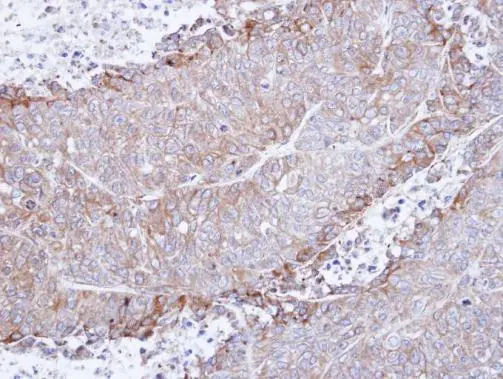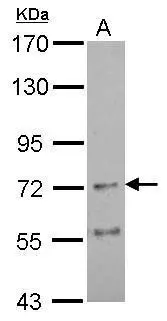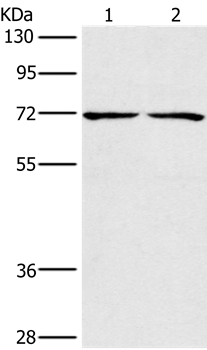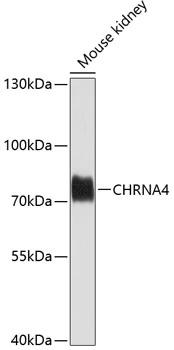
Immunohistochemical analysis of paraffin-embedded DLD-1 xenograft , using Nicotinic Acetylcholine Receptor alpha 4(GTX113653) antibody at 1:100 dilution.
Antigen Retrieval: Trilogy? (EDTA based, pH 8.0) buffer, 15min
AChR alpha 4 antibody [N1C1]
GTX113653
ApplicationsWestern Blot, ImmunoHistoChemistry, ImmunoHistoChemistry Paraffin
Product group Antibodies
ReactivityHamster, Human, Mouse
TargetCHRNA4
Overview
- SupplierGeneTex
- Product NameAChR alpha 4 antibody [N1C1]
- Delivery Days Customer9
- Application Supplier NoteWB: 1:500-1:3000. IHC-P: 1:100-1:1000. *Optimal dilutions/concentrations should be determined by the researcher.Not tested in other applications.
- ApplicationsWestern Blot, ImmunoHistoChemistry, ImmunoHistoChemistry Paraffin
- CertificationResearch Use Only
- ClonalityPolyclonal
- Concentration0.39 mg/ml
- ConjugateUnconjugated
- Gene ID1137
- Target nameCHRNA4
- Target descriptioncholinergic receptor nicotinic alpha 4 subunit
- Target synonymsBFNC, EBN, EBN1, NACHR, NACHRA4, NACRA4, neuronal acetylcholine receptor subunit alpha-4, cholinergic receptor, nicotinic alpha 4, cholinergic receptor, nicotinic, alpha 4 (neuronal), cholinergic receptor, nicotinic, alpha polypeptide 4, neuronal nicotinic acetylcholine receptor alpha-4 subunit
- HostRabbit
- IsotypeIgG
- Protein IDP43681
- Protein NameNeuronal acetylcholine receptor subunit alpha-4
- Scientific DescriptionThis gene encodes a nicotinic acetylcholine receptor, which belongs to a superfamily of ligand-gated ion channels that play a role in fast signal transmission at synapses. These pentameric receptors can bind acetylcholine, which causes an extensive change in conformation that leads to the opening of an ion-conducting channel across the plasma membrane. This protein is an integral membrane receptor subunit that can interact with either nAChR beta-2 or nAChR beta-4 to form a functional receptor. Mutations in this gene cause nocturnal frontal lobe epilepsy type 1. Polymorphisms in this gene that provide protection against nicotine addiction have been described. [provided by RefSeq]
- ReactivityHamster, Human, Mouse
- Storage Instruction-20°C or -80°C,2°C to 8°C
- UNSPSC12352203
References
- Xu Y, Cao K, Guo B, et al. Lowered levels of nicotinic acetylcholine receptors and elevated apoptosis in the hippocampus of brains from patients with type 2 diabetes mellitus and db/db mice. Aging (Albany NY). 2020,12(14):14205-14218. doi: 10.18632/aging.103435Read this paper
- Weir DL, Smith IL, Bossart KN, et al. Host cell tropism mediated by Australian bat lyssavirus envelope glycoproteins. Virology. 2013,444(1-2):21-30. doi: 10.1016/j.virol.2013.06.016Read this paper

![Whole cell extract (30 μg) was separated by 7.5% SDS-PAGE, and the membrane was blotted with AChR alpha 4 antibody [N1C1] (GTX113653) diluted at 1:1000. The HRP-conjugated anti-rabbit IgG antibody (GTX213110-01) was used to detect the primary antibody. Whole cell extract (30 μg) was separated by 7.5% SDS-PAGE, and the membrane was blotted with AChR alpha 4 antibody [N1C1] (GTX113653) diluted at 1:1000. The HRP-conjugated anti-rabbit IgG antibody (GTX213110-01) was used to detect the primary antibody.](https://www.genetex.com/upload/website/prouct_img/normal/GTX113653/GTX113653_40142_20220311_WB_w_23060501_893.webp)






